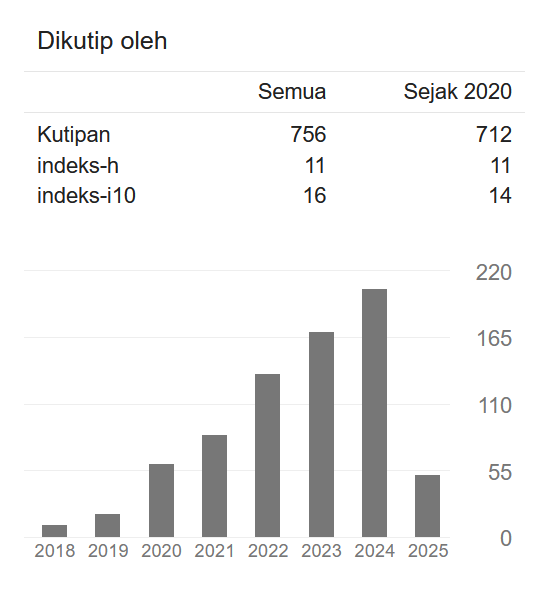Feminist Approaches In Islamic Studies
DOI:
https://doi.org/10.19109/medinate.v19i1.17910Keywords:
Approach, Feminism, Islamic StudiesAbstract
The purpose of this writing is to understand 3 things: first, the concrete form of the feminist approach. Second, the factors that influence the existence of a feminist approach in Islamic studies. Third, the implications of academic feminist approaches to the dynamics of Islamic studies. The author uses the literature method by using a feminist approach in studying Islam. The results of this study show that first, feminist etymology comes from the word femme (single woman) who fought to fight for the rights of women as a social class. In terminology a women's movement that demands full equality. Second, internal factors include low knowledge and understanding of the community about religious values related to the role and function of women, the reality of Muslim society that still experiences gender bias, as well as the essence of women's bodies.external factors include the number of religious interpreters who harm the position and role of women as well as patriarchal culture that has long dominated in society (political, economic, and biased interpretation of religious texts gender). Third, positive impact: The existence of the term career woman makes women become more independent women, women are not oppressed by the capitalist system, and are productive in doing things outside the domstic. Negative impact: Negative impact (the birth of various lesbian feminism movements or the practice of free sex between women and women), and There are several ideologies of the feminism movement that are not in accordance with Islamic corridors
References
Adiyoso, W. (2021). Urgensi Pendekatan Multi dan Inter-disiplin Ilmu dalam Penanggulangan Bencana. Bappenas Working Papers, 4(2), 167–177. https://doi.org/10.47266/bwp.v4i2.104
Al-finnas, S., & Rahayu, R. (2019). Dekonstruski Inferioritas Perempuan (Pendekatan Feminisme Agama). An-Nisa, 11(1), 345–353. https://doi.org/10.30863/an.v11i1.301
Andriani, A. (2017). Pendekatan Gender dalam Studi Qur’an. Al-Tsiqoh : Islamic Economy and Da’wa, 2(3), 31–47. file:///C:/Users/HP/Downloads/167-Article Text-572-1-10-20190119 (1).pdf
Fakih, M. (2010). Analisis Gender dan Transformasi Sosial. PustakaJingga.
Fitriawati, E., Syam, C., & Wartiningsih, A. (2014). Kajian Feminisme dalam Antologi Cerpen Kami (Tak Butuh) Kartini Indonesia Karya Novela Nian, dkk. Jurnal Pendidikan Dan Pembelajaran Khatulistiwa, 3(2715–2723), 1–11.
Gafur, A. (2015). Pendekatan Feminis Dalam Kajian Islam. Al-Tatwir, 2(1), 153–174.
Ghozali, M. (2020). Ambiguitas tafsir feminis di Indonesia: antara wacana teks dan wacana feminis atas ayat penciptaan manusia. Yinyang : Jurnal Studi Islam, Gender Dan Anak, 15(2), 175–200. https://doi.org/10.24090/yinyang.v14i2.2019.pp
Hidayati, N. (2018). Teori Feminisme. Jurnal Harkat: Media Komunikasi Gender, 14(9), 21–29. https://jurnal.unipasby.ac.id/index.php/bastra/article/view/5023/3589
Ismail, I. (2019). Pendekatan Feminis Dalam Studi Islam Kontemporer. Jurnal Hawa : Studi Pengarus Utamaan Gender Dan Anak, 1(2), 217–238. https://doi.org/10.29300/hawapsga.v1i2.2601
Izziyana, W. V. (2016). Pendekatan Feminisme Dalam Studi Hukum Islam. ISTAWA: Jurnal Pendidikan Islam, 2(1), 139–158.
Karim, A. (2014). Kerangka Studi Feminisme. Fikrah, 2(1), 57–74.
KBBI. (n.d.).
Mustaqim, A. (2008). Paradigma Tafsir Feminis: Membaca al-Qur‟an dengan Optik Perempuan. Logung Pustaka.
Mutmainnah. (2018). DAMPAK GERAKAN FEMINISME DALAM PERSPEKTIF HUKUM ISLAM KONTEMPORER. Skripsi, 1–85.
Najah, N., & Fitrian, Z. (2021). Perempuan Dalam Tafsir; Upaya Pembacaan Feminis Terhadap Teks-Teks Agama. REVELATIA: Jurnal Ilmu Al-Qur`an Dan Tafsir, 2(1), 31–47. https://doi.org/10.19105/revelatia.v2i1.4139
Putra, N. P. (2022). ANALISA TENTANG KONSEP FEMINISME. DIROSAT: Journal of Islamic Studies, 7(2), 99–106.
Rohmatika, R. V. (2019). Pendekatan Interdisipliner dan Multidisipliner Dalam Studi Islam. Al-Adyan: Jurnal Studi Lintas Agama, 14(1), 115–132. https://doi.org/10.24042/ajsla.v14i1.4681
Rozali, M. (n.d.). Metodelogi Studi Islam Dalam Perspectives Multydisiplin Keilmuan.
Sari, R. K. (2021). Penelitian Kepustakaan Dalam Penelitian Pengembangan Pendidikan Bahasa Indonesia. Jurnal Borneo Humaniora, 4(2), 62. http://jurnal.borneo.ac.id/index.php/borneo_humaniora/article/view/2249
Sudikan, S. Y. (2015). PENDEKATAN INTERDISIPLINER, MULTIDISIPLINER, DAN TRANSDISIPLINER DALAM STUDI SASTRA. Jurnal Unesa, 13(1), 104–116. https://journal.unesa.ac.id/index.php/paramasastra/article/download/1496/1011
Suryorini, A. (2012). Menelaah Feminisme Dalam Islam. Sawwa: Jurnal Studi Gender, 7(2), 21. https://doi.org/10.21580/sa.v7i2.647
Umro’atin, Y. (2020). Pengantar Studi Islam.
Wirasandi. (2019). Wanita dalam Pendekatan Feminisisme. Selong: Universitas Gunung Rinjani Volume 7 Nomor 2, 7(2), 47–58. https://jurnal.ugr.ac.id/index.php/jir/article/download/122/86
Zakiyah, U. (2020). Posisi Pemikiran Feminis Faqihuddin Dalam Peta Studi Islam Kontemporer. The International Journal of Pegon : Islam Nusantara Civilization, 4(02), 115–138. https://doi.org/10.51925/inc.v4i02.33








